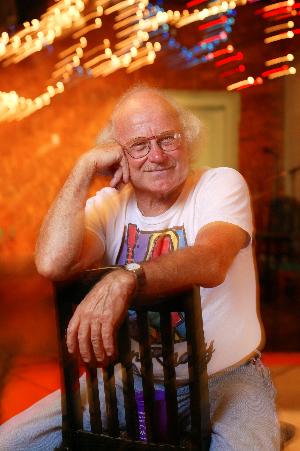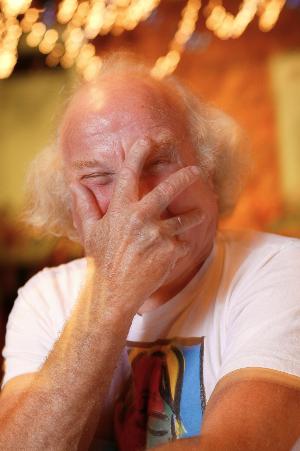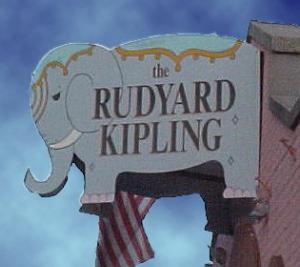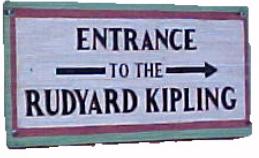social bookmarking tools:
 |
|
| Available RSS Feeds |
|---|
 - Top Picks - Top Picks |
 - Today's Music - Today's Music |
 - Editor's Blog - Editor's Blog
|
 - Articles - Articles
|
Add Louisville Music News' RSS Feed to Your Yahoo!
|

Although it was John Godfrey Saxe and not Rudyard Kipling who wrote the famous poem, "The Six Blind Men and the Elephant," the Bombay-born Kipling was no doubt familiar with the ancient Hindu fable on which the poem was based. The painted Indian elephants which grace the sign of the Rudyard Kipling here in Louisville are certainly an intentional nod to the club's namesake, but may be a less obvious nod to the fable, in which each of the blind men in question perceives the animal as something vastly different from the others. "The Rud," as it's affectionately known, is perceived by some as a comfy neighborhood pub; by others, a destination for live, genre-spanning original music by up-and-coming locals and established touring artists alike; by still others, a home for experimental theatre, poetry readings and performance art. It is, of course, all of these things and that's exactly what owners Ken Pyle and Sheila Joyce envisioned when they first opened the club in 1985.
That vision actually began in 1966, when the social-crusading Ken first met the guitar-toting Sheila at a small party. "It was lust at first sight," she says with a wink. Married later that same year, the couple spent much of their social time at The Shack, a Bardstown Road blues hangout adjacent to the Mid-City Mall where the liberal-minded met to eat, drink and discuss the issues of the day. Ken and Sheila bought The Shack the following year, renaming it the Roundtable Theater and hosted everything from local singers to the first meetings of the Cherokee Democrat Club. "We were anti-war and pro-civil rights," Ken reminisces, noting that those views haven't changed over the years. "We were involved in all the open housing marches, that whole thing." Both he and Sheila laugh heartily as they describe the early years of the club. "We were regarded with fear and trembling, suspected of not liking Richard Nixon and other treasonable acts," Sheila says dryly, "and at one time, we were really persecuted and regarded with horror for flying the Vietnamese Flag." (The one-starred flag in question was actually the state flag of Texas, Ken's homage to his birthplace of Houston). While Ken was campaigning for equal housing and civil rights legislation during the day, Sheila baked her whole grain breads and made her heirloom recipes for burgoo and snappy beer cheese for the evening crowd. At night, Ken tended bar and kept the peace, a considerable task back in the days when the now-fashionable restaurant row was a crumbling neighborhood strip marked by a proliferation of head shops and which regularly attracted such clientele as the infamous Outlaws motorcycle gang. "There were some bad characters, bad characters," Ken admits with a shake of his head. "The neighborhood was deteriorating," adds Sheila. "It was becoming not at all fashionable to live there."

Still, there were plenty of good times. Both Ken and Alan Rhody remember one particular rainy night when Rhody (still known by his given name of Allen Kohnhorst at the time) led an impromptu parade through the Mid-City Mall parking lot, inspired by the song on the jukebox.
"It was Dylan's Rainy Day Women #12 & 35," recalls Rhody, whose first paying musical job was at The Roundtable. "We were well-lubricated with beer and we just kept playing it over and over again. A line formed in the bar and we went up and down the length of the place a few times. I popped open an umbrella, just for effect. The next thing I knew, we were all dancing in a single file out the door, some with umbrellas, some without. In those days there wasn't a whole lot else going on out on Bardstown Road late at night and we could still hear the jukebox from the Mid-City Mall parking lot. Of course, we were all singing at the top of our lungs, too."
After a storm demolished the Roundtable sign, Ken and Sheila decided the entire club was in need of significant renovation and afterward re-named it the Storefront Congregation. The club began to earn some serious musical credibility with visiting performers such as Ralph Stanley, but the unavailability of a liquor license was a continuing problem. In addition, Storefront Congregation was also one of the first venues in Louisville to attempt a non-smoking policy. "It was smoke-free all right," quips Sheila. "It was customer free!" Ken and Sheila closed the club in 1974, when they packed up the kids (Ted, Megan and Andy) and moved to Berea, Kentucky, to care for Sheila's ailing father.

Bardstown Road property values skyrocketed during their absence, partly due to extensive neighborhood repairs in the aftermath of the 1974 tornado, a sudden influx of new businesses (many of them restaurants) and the designation of the Cherokee Triangle area as a historic preservation district. Upon their return to Louisville in 1976, Ken and Sheila had to look elsewhere to rebuild their dream venture. After the Highlands, Old Louisville was the next most likely established neighborhood to stand on the verge of renewable respectability - beautiful architecture, important proximity to the business district, the airport and the University of Louisville - and a buyer's market for those willing to renovate and restore. Ken and Sheila bought a home on First Street and began looking for another place in the neighborhood to serve as a potential business location.
They finally put an option on a building near the corner of Fourth and Oak Streets. The location had a rather colorful history, first as the Crosstown Cafe and later as a seedy go-go club known as Domino II. "What a den of iniquity that was!" Ken says of the area. "Murders, prostitution, you name it." Both he and Sheila had reservations about the neighborhood, but were optimistic. "Residences were being restored," notes Sheila, "and we expected the business district would be restored as well." After two years of renovation, they finally opened the new club as The Rudyard Kipling in January of 1985. In addition to Sheila's famous concoctions from the Storefront Congregation days, the pub boasted a full gourmet vegetarian menu when most restaurants merely accommodated their non-carnivorous customers with salads and vegetable plates.
The split-level design of the red brick building at 422 West Oak lent itself well to both a casual dining/drinking area and a separate performance space. Musicians were instinctively drawn to the upper floor's innate acoustics and intimacy and the Rud was immediately adopted as the home of the Louisville Area Songwriters Cooperative for its long-running weekly workshop showcases. The LASC disbanded in 1995, but the Rud remains arguably the most singer-songwriter friendly venue in Louisville. Danny Flanigan is the host of "The Listening Room," a non-smoking, no-talking monthly singer-songwriter showcase at the Rud and considers it the finest room in town for such gatherings. "The room is special," he says. "It's corny, I know, but that's the best way to describe it. There's something about the place that's more than light bulbs and knobs and speakers - there's a near-instant vibe. I've performed over 2,000 times since age 17 and I've had some of my best moments as a performing artist in that room."

Ken and Sheila, both singers and songwriters themselves, relished the opportunity to support the burgeoning talent in the area but didn't limit that support to one type of music. Everything from jazz jam sessions to indie rock startups has always been welcomed with open arms and it's proven a boon to many a young band, especially those who aren't easily classified. Alan Canon has played with some of Louisville's most eclectic acts, including The Belgian Waffles, GEEK! and Monkey Boy and is both amazed and encouraged by the variety of music booked in to the club.
"The Rudyard Kipling books from more genres of Louisville music than any other venue I could name," he says. "A lap-dulcimer player can develop a following at the Rudyard by playing once or twice for friends on the stage and be incidentally admired by the leather-jacket type who's playing electric bass in the punk act that follows."
Proponents of avant-garde theatre and poetry have been equally welcomed, which may seem something of a dilemma to the uninitiated. Those who like theatre may not be tempted to stay for the music, or vice-versa and up until two years ago, when the Rud finally jumped on to the world wide web, there wasn't always a way to determine in advance what was happening on any given night. Neither Ken nor Sheila see the lack of predictability as a hindrance to their ability to draw the regulars, however and cherish those adventurous souls who come not knowing or caring what particular kind of intellectual stimulation they might take away from an evening there. "There's an elite group who understand," explains Sheila of the club's multi-faceted entertainment policy. "They get it and they love it."
Still, Old Louisville development has been slower than projected and many area businesses have failed or moved away, as the money that pours in to the neighborhood to renovate property doesn't appear to fuel shopping or nightlife on the block. Nor does it seem to curb the crime. "Fourth and Oak retains its dubious reputation," laments Sheila. Most performing artists don't see the location as a deterrent. "Those who don't come to the Rud because of location, that's their loss," says Flanigan. "The Rud is a no-brainer for what I'm trying to do." There are plenty of potential patrons, however, who don't consider the Rud a regular destination because of the urban discomfort factor. Ken doesn't blame those who don't want to brave what he refers to as "the gauntlet of drunks and punks." The dwindling crowds are barely enough to keep a lot of Old Louisville businesses - including the Rud - afloat. Ken cites at least three nearby businesses which have failed in recent months.
Greg Handy, who served as 8th Ward alderman for just over a decade, agrees that the historic neighborhood has yet to achieve its modern potential. "One of the reasons, in my opinion, is that there were three different aldermen representing that neighborhood between 1992 and 2003," he says. "The whole Oak Street corridor suffered because there was no continuity of leadership at City Hall." Handy's relationship with the Pyles pre-dates his political connection to the neighborhood. He first met the couple while working for a local lawn service in the mid-Seventies and has considered them friends ever since. The Rud had been re-districted to the 10th Ward by the time Handy came on board as alderman, but he is quick to praise Ken and Sheila for their willingness to offer their space for the many neighborhood association and Oak Street Business Corridor meetings. "Those types of small business owners, they understand about community and neighborhood. Those are the kinds of people you want doing business in your area."
Obviously, the Pyles have never been in business strictly for the money and Ken is quick to admit that "We've always had difficulty paying our bills." When financial problems last year threatened the loss of the club's liquor license, however, Ken was motivated to bring in a consultant from SCORE, the Service Corps of Retired Executives. The consultant's first thought was to form something of an advisory group of regular club constituents. One of those regulars was Ray Rizzo, drummer for such well-known Louisville bands as Days of the New and Java Men, who brought a novel awareness-raising concept to the table.
Rizzo's idea was to produce a fund-raising tribute disc. "I just thought that a CD would be a way for everyone's love and efforts to amount to something tangible," he says. "With all the talk of Louisville needing to support its music scene, it was obvious to me that bands would want to lend support to places like the Rud." Rizzo knew he would have no trouble rounding up artists and bands to contribute songs to the cause, but even he was surprised at how many stepped forward, some even offering previously unreleased material. In total, thirty-nine bands answered the call in time for inclusion on the double-disc set. "There could have been more," he continues. "A bunch of the bands don't play anywhere but the Rud, so you have a specific celebration of the venue - but then a few of the bands are doing well or have done well nationally. It was great to connect them to the legacy."
Part of that legacy stems from the support that the Rud has always shown for local bands, whether or not they have an established reputation. "I've known Ken and Sheila since 1967," declares Rhody, "and they've both always been committed to not only supporting live music, but have nurtured many musicians along the way - some of whom are very famous now - by giving them a stage from which to present their music to the public. If Ken and Sheila hadn't been there with the Roundtable Theater, the Louisville music scene as we know it today would not be as rich as it is. The Rudyard Kipling has been like the `second chapter' in a long, wonderful story."
Staci Roark, a member of the sadly short-lived girl group The Pointy Kitties, praises the Pyles for giving up-and-coming bands the encouragement they need to build a following. Despite the fact that The Pointy Kitties were just learning to play their instruments when they played those first gigs, she says, "They gave us the stage. They don't dictate what kind of show you can put on, how much you have to charge or who you should line up and that kind of open-door policy is really inspiring. . . . they show a confidence in everyone who plays there. As an inexperienced band, it's a very welcoming and encouraging feeling. It played a significant role in our development as a band." Adds Canon, "Ken lets new and experimental groups play shows which are not expected to produce a large turnout. Beyond letting us in the door again and again, Ken takes an active interest in all of these different musics and performance modes. We're privileged as musicians to have him as a frequent audience member at our shows and it's great to get kudos from someone who's heard as much as he has."
Rizzo insisted that the CD project serve not only as a possible revenue generator for the club, but as a compilation that would favorably stand against - or even outshine - any previous Louisville music collection, as that factor alone would serve as a testament to the commitment the Rud has demonstrated for local talent. "I loved the idea that a project to support the Rud was just as supportive to the bands who were on it," says Rizzo. "That's just the way Ken would have it and he recognized that potential early on. Even in its own tribute, the Rud was being proactive for the music community."
The Mother Lodge, which takes its title from a Rudyard Kipling poem, could have easily been a logistical nightmare to pull together. With the help of fellow musicians Charles Bailey, Bill Green and Tom Cantrell, however, Rizzo was able to collect the songs, master the recording and have the discs manufactured in a mere four months. The double disc set was unveiled in March with a festive two-night CD release party, during which even Ken and Sheila themselves took the stage for a couple of songs with Steve Ferguson. All costs were recouped prior to the end of the second evening and all future proceeds will go directly to the Rud. Rizzo acknowledges the unusual nature of raising funds for a for-profit establishment, but adds, "From where I sit, there's nothing wrong with supporting the venues and people who continue to be a source of energy for the city's creativity."
The financial outlook for the Rud is still far from rosy, but Rizzo feels that the renewed awareness of the venue's value has already paid off in terms of increased local bookings and media attention. Improvements to the Rud's performance space have also been made and the club's web presence has garnered recent dinner reservations from as far away as New Orleans and San Francisco. Handy, whose aldermanic sponsorship has funded such musical projects as WFPK's Live Lunch performance series, is cautiously optimistic for the club and its continuing impact on the local music scene. "We don't need to lose that music venue," he says emphatically. Long-time Old Louisville resident John Sistarenik agrees. The current chairperson of the Old Louisville Neighborhood Council, he considers the Rud an important component of the area. "What I've always liked about the Rud, outside of Ken and Sheila's community involvement, is the way the Rud is symbolic of the neighborhood itself," he says. "I see the Rud as part of the neighborhood and also representing the very characteristics of the neighborhood. Despite our Victorian architecture, we're really one of the most cutting-edge neighborhoods in terms of activism and diversity - social, racial and economic. The Rud has that kind of cutting edge diversity as well, as do a lot of the groups that play there."
Rizzo hopes that media attention for The Mother Lodge will further fuel the reputation of the Rud - and its part in generating Louisville's current status as a thriving home for original talent worthy of a second look by entertainment industry movers and shakers. Already among the duly impressed is David Dye, host of WXPN's syndicated public radio stalwart, World Café, who received a hand-delivered copy while attending WFPK's annual non-commercial radio conference this past May. "This is unbelievable!" he exclaimed as he read over the package, noting such Louisville luminaries as My Morning Jacket, Peter Searcy, King Kong and Love Jones. Sheila is not surprised by that type of reaction. "I take The New Yorker," she says, "and every few weeks there will be some casual mention in there of how Louisville is just the hotbed of original music these days. I like to think that we're a part of that."
Still, the Pyles are rapidly approaching retirement age and have wondered aloud how much longer they'll want to work the kind of hours the Rud requires even under the best of financial conditions. "Even if Ken and Sheila did call it a day right now, I'd be sad," says Rizzo, "but I wouldn't feel like the Rud had been defeated. These are two people who continue to work against the grain, answering to their inspirations and a duty to the community." Adds Rhody, "I think of the two of them as huge contributors to the `real' Louisville, in a people sense as well as in a cultural one."
Ken is humbled by such praise and buoyed by the attention and assistance that has come his way since the Rud's troubles became public knowledge last fall. He and Sheila are a contented couple, obviously still very much in love and extremely grateful for a full life, despite the ups and downs of the homegrown business they've tended for decades. They easily finish each other's sentences and gently correct the other's occasionally foggy memories, but neither has lost their edge when it comes to either music or politics. When asked for a mission statement for the Rudyard Kipling, Sheila doesn't miss a beat. "Make art, not war," she grins.
